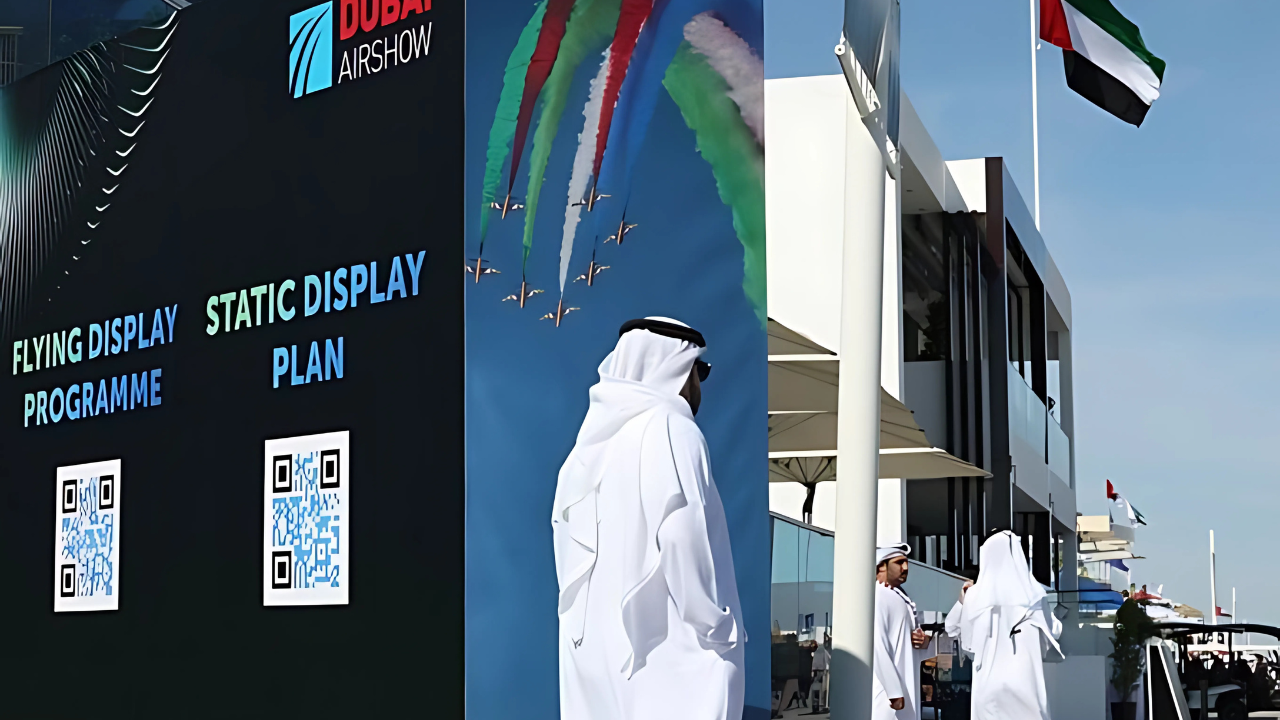
Post by : Shivana Rahim
In a significant and highly sensitive move, several Israeli defense companies have been officially barred from participating in the Dubai Air Show 2025. This decision comes amid rising regional tensions and growing anger in the Gulf following Israel’s ongoing military campaign in Gaza and a recent unprecedented Israeli airstrike on Qatar. The exclusion of Israeli firms marks a notable shift in diplomatic and defense industry relations in the Middle East, posing complex questions about the evolving geopolitical landscape and its impact on international aerospace exhibitions.
The Dubai Air Show is recognized as one of the world’s largest aerospace and defense exhibitions. Held biennially in the United Arab Emirates, the event is a critical platform for showcasing cutting-edge aviation technology, military hardware, and advanced aerospace innovations. The show brings together government officials, defense contractors, and industry giants from across the globe, serving as a hub for strategic partnerships and commercial deals.
Historically, since the normalization of relations between UAE and Israel through the Abraham Accords in 2020, Israeli defense companies have actively participated in regional defense exhibitions, including the Dubai Air Show. Their presence symbolized growing cooperation, technology exchange, and shared security interests in the Gulf region.
On September 9, 2025, following an Israeli airstrike targeting Hamas leaders in Doha, Qatar, organizers sent an official letter to several Israeli defense companies informing them of their exclusion from this year's air show. The letter, while citing "professional shortcomings," originated against a backdrop of deepening regional ire and diplomatic fallout from the anti-Qatar bombing.
This airstrike provoked widespread condemnation from Gulf states, including the UAE, which viewed the attack as a breach of sovereignty and an escalation of hostilities. Qatar, acting as a peacemaker in Gaza ceasefire negotiations, expressed outrage, contributing to the diplomatic tension rippling across the Middle East.
The exclusion of Israeli firms from the Dubai Air Show has elicited mixed reactions. Officials from Israel’s Defense Ministry confirmed receiving the notification but refrained from detailed comment. Israeli defense industry leaders remain hopeful but acknowledge the challenging diplomatic environment.
From the UAE side, official government media have declined to comment publicly on the decision. However, it signals a clear stance of distancing amid regional grievances, even as previous defense cooperation projects—such as Israeli unmanned systems and AI ventures tied to UAE firms—have paved the way for lasting professional ties.
The move also mirrors international reactions, with the UK recently barring Israeli officials from its defense expo, and France blocking Israeli firms from showcasing weaponry linked to Gaza on its soil. This pattern illustrates a growing wariness and political sensitivity about Israeli defense participation in global exhibitions.
The Dubai Air Show ban on Israeli companies unfolds against a backdrop of a 23-month-long Gaza military campaign, proxy conflicts involving Iran, and wider Middle East unrest. Amid these tensions, the Emirates find themselves balancing between maintaining diplomatic ties and responding to Gulf regional sentiment.
The decision complicates the narrative of the Abraham Accords, raising questions about the durability of warming ties caused by persistent external conflicts. It reveals how military events can swiftly alter economic and political cooperation even between normalized states.
For the aerospace and defense sectors, this ban impacts the showcasing of Israeli innovations, joint projects, and potential deals at a key global platform. It underscores the risks businesses face when geopolitical conflicts influence international trade fairs.
Israeli companies like Israel Aerospace Industries (IAI), Elbit Systems, and others have previously played roles in UAE-based ventures, including drone technology, electro-optics, and cyber defense collaborations. The ban disrupts visibility and commercial interactions expected at the Dubai Air Show but also encourages diversification and exploration of alternative venues.
The evolving situation leaves room for developments as the situation unfolds. Israeli defense firms have not fully ruled out participation pending diplomatic progress, but the current climate casts doubt on near-term cooperation.
International actors, including Washington, have expressed concerns about escalating Gulf tensions, indicating the broader significance of such decisions beyond regional borders. The Dubai Air Show organizers also face the challenge of balancing regional political realities with ambitions of global inclusivity.










Curry Powers Warriors to Nail-Biting 109-108 Victory Against Spurs
Stephen Curry's 49 points propel the Warriors to a dramatic 109-108 NBA Cup triumph over the Spurs,

India Advances to Semi-Finals After Thrashing USA in Women’s Blind T20 World Cup
India secured a dominant ten-wicket victory over the USA, advancing to the semi-finals in the Women’

South Africa's Early Advantage as India Struggles on Day Two
On Day Two, India reached 138-4 as South Africa took three early wickets, complicating matters with

Kenta Nishimoto Defeats Lakshya Sen in Japan Masters Semifinal
Lakshya Sen's journey in the Japan Masters ends after losing to Kenta Nishimoto 19-21, 21-14, 12-21

Kenta Nishimoto Defeats Lakshya Sen in Japan Masters Semifinals
Lakshya Sen's run at the Japan Masters concludes with a loss to Kenta Nishimoto in the semifinals, 1

Major IPL Trade: Jadeja Joins Royals as CSK Signs Samson
In a significant IPL trade, CSK has acquired Sanju Samson from Rajasthan Royals in exchange for Ravi